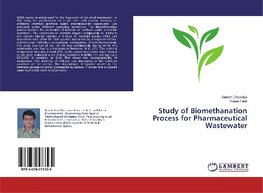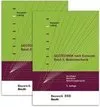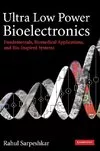
-
 Anglický jazyk
Anglický jazyk
Study of Biomethanation Process for Pharmaceutical Wastewater
Autor: Suresh Chovatiya
UASB reactor is widely used for the treatment of industrial wastewater. In this study, the performance of a lab-scale UASB reactor, treating an antibiotic chemical synthesis based pharmaceutical wastewater was evaluated under different operating conditions.... Viac o knihe
Na objednávku
36.99 €
bežná cena: 41.10 €
O knihe
UASB reactor is widely used for the treatment of industrial wastewater. In this study, the performance of a lab-scale UASB reactor, treating an antibiotic chemical synthesis based pharmaceutical wastewater was evaluated under different operating conditions. The biomethanation process involves the conversion of biomass to methane under anaerobic conditions. This conversion of complex organic compounds to methane and carbon dioxide requires a mixture of bacterial species which can depend on each other for their growth and occurs by a sequence of four reaction steps: hydrolysis, acidogenesis, acetogenesis, and methanogenesis. The study was carried out for 30 days continuously during which the wastewater was having a temperature between 18 to 22°C. The ambient temperature was also around 20°C, as the season was winter. Experimental results were evaluated as per Indian Standards & APHA. The average ratio BOD/COD is obtained as 0.34. This shows the biodegradability of wastewater. The alkalinity of influent was decreasing at the optimum condition of the reactor. The degradation of biomass results in the methane generation which is measured by balloon. The methane produced varies from 0.002 m3/d to 0.024 m3/d.
- Vydavateľstvo: LAP LAMBERT Academic Publishing
- Rok vydania: 2019
- Formát: Paperback
- Rozmer: 220 x 150 mm
- Jazyk: Anglický jazyk
- ISBN: 9783659573569



 Nemecký jazyk
Nemecký jazyk 







